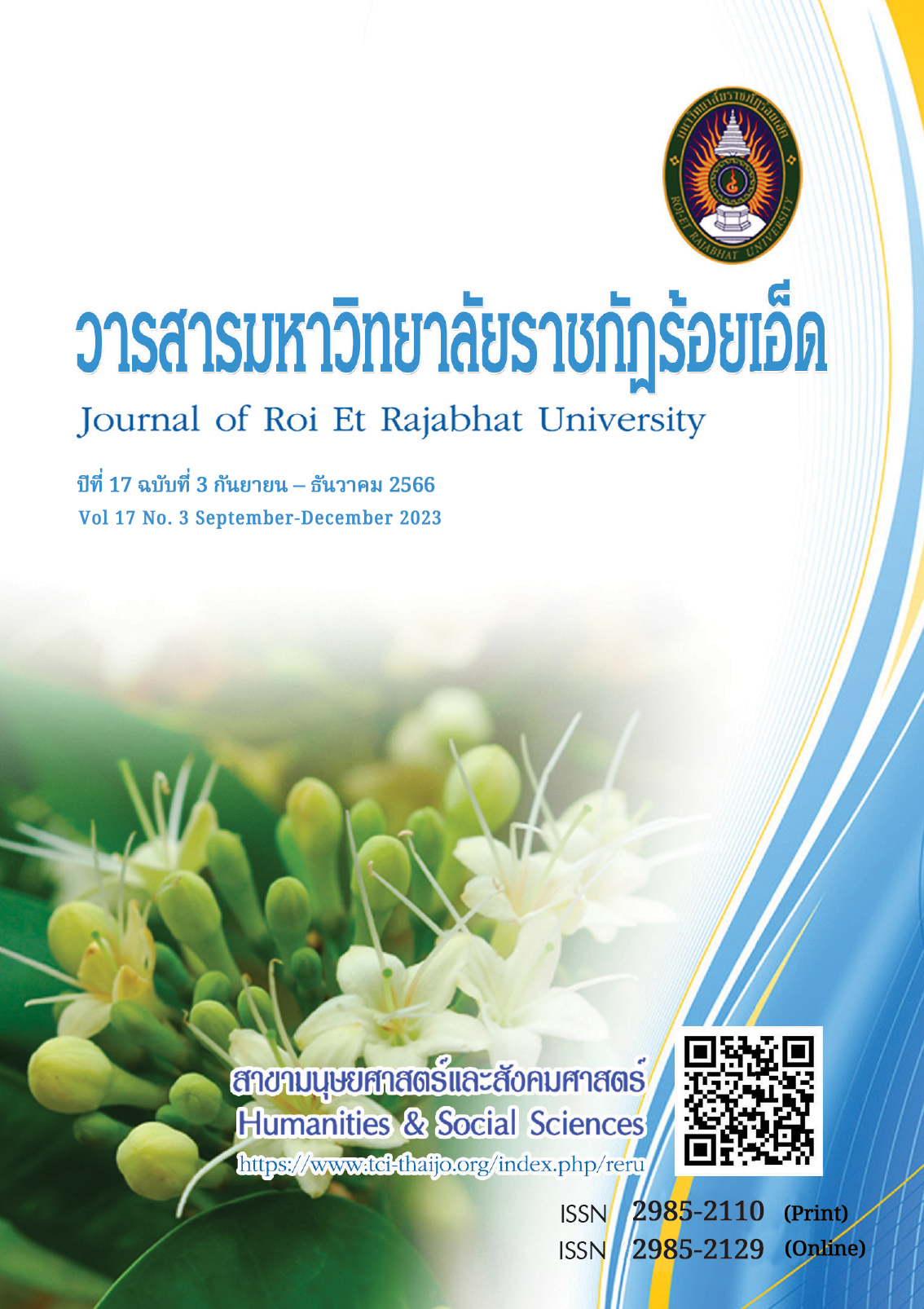Marketing Mix Factors on Thai Tourists’ Behaviors in New Normal Tourism at Tourist Attraction of Mueang District, Ranong
Keywords:
Marketing Mix Factors, New Normal Tourism, Tourist behaviors in New Normal TourismAbstract
The objective of this research was to investigate the Marketing Mix Factors that influence the new normal tourism behavior of Thai tourists in Mueang Ranong District, Ranong Province. This study employed a quantitative research approach, utilizing questionnaires as the data collection tool. The gathered data were analyzed using a statistical program, employing descriptive statistics including percentage, mean, standard deviation, and multiple regression analysis with the Enter technique. The behavior of tourists in the new normal tourism setting was elucidated using a confidence level of 95%. The findings revealed that Regarding the assessment of Marketing Mix Factors in the context of new normal tourism among Thai tourists in Mueang Ranong District, Ranong Province, the overall opinion level was found to be the highest. When examining each aspect,
it was observed that the factors with the highest average values were process, followed by physical evidence, people, product, place, price, and promotion. The results of the hypothesis testing demonstrated that several Marketing Mix Factors significantly influence the new normal tourism behavior of Thai tourists in Mueang Ranong District, Ranong Province. Specifically, product, price, place, people, process, and physical evidence exhibited statistical significance at the 0.05 level. However, in the context of the COVID-19 crisis, marketing promotion was found to have no effect on new normal tourism behavior.
References
กระทรวงการท่องเที่ยวและกีฬา. (2566). สถิติด้านการท่องเที่ยวปี 2566 (Tourism Statistics 2023). สืบค้นเมื่อ 20 กุมภาพันธ์ 2566, จาก https://www.mots.go.th/news/category
กระทรวงการท่องเที่ยวและกีฬา. (2564). สรุปสถานการณ์พักแรม จำนวนผู้เยี่ยมเยือน และรายได้จากผู้เยี่ยมเยือน เดือนมกราคม- ธันวาคม 2564. สืบค้นเมื่อ 29 กันยายน 2564, จากhttps://www.mots.go.th/more_news_new.php?cid=639&fbclid
ชนิสรา กุลสันติวงศ์. (2564). ปัจจัยที่มีอิทธิพลต่อการตัดสินใจเดินทางท่องเที่ยวของนักท่องเที่ยวชาวไทย Generation Y หลังโรคระบาดโควิด-19. การค้นคว้าอิสระ บริหารธุรกิจมหาบัณฑิต สาขาวิชาการจัดการ. กรุงเทพฯ: มหาวิทยาลัยกรุงเทพ.
ณรงค์ โพธิ์พฤกษานันท์. (2551). ระเบียบวิธีวิจัย. กรุงเทพฯ: ส.เอเซียเพรส.
ดาวเดือน อินเตชะ, พิมพ์พิศา จันทร์มณี และภูดิส เหล็งพั้ง. (2565). ปัจจัยส่วนประสมทางการตลาดที่ส่งผลต่อพฤติกรรมการท่องเที่ยวของนักท่องเที่ยวที่เดินทางเข้ามาท่องเที่ยวในจังหวัดลำปาง. ลำปาง: วิทยาลัยอินเตอร์เทคลำปาง.
บุญเลิศ จิตตั้งวัฒนา. (2548). อุตสาหกรรมการท่องเที่ยว. กรุงเทพฯ: มหาวิทยาลัยธรรมศาสตร์.
ธงชัย สันติวงษ์. (2540). พฤติกรรมการบริโภคทางการตลาด (พิมพ์ครั้งที่ 9). กรุงเทพฯ: ไทยวัฒนาพานิช.
ธนันธร มหาพรประจักษ์. (2563). ปรับธุรกิจให้อยู่รอดในยุค New Normal. ฝ่ายนโยบายการเงินธนาคารแห่งประเทศไทย. สืบค้นเมื่อ 20 สิงหาคม 2564, จาก https://www.bot.or.th/th/research-and-publications/articles-and-publications/articles/Article_19Oct2020.html
ธานินทร์ ศิลป์จารุ. (2548). การวิจัยและการวิเคราะห์ข้อมูลทางสถิติด้วย SPSS (พิมพ์ครั้งที่ 4). กรุงเทพฯ: วี.อินเตอร์ พริ้นท์.
ปฐมพงษ์ บำเริบ. (2564). ปัจจัยส่วนประสมทางด้านการตลาดบริการ ที่มีผลต่อการเลือกเส้นทางการท่องเที่ยวย่านริมน้ำ
ฝั่งธนบุรี. วารสารเกษตรศาสตร์ธุรกิจประยุกต์, 15(23), 59-78.
โพสต์ทูเดย์. (2021). Klook แนะ 7 เทรนด์ท่องเที่ยวยุคใหม่. สืบค้นเมื่อ 15 ธันวาคม 2564, จาก https://www.posttoday.com/business/663358
มหาวิทยาลัยมหิดล. (2564). NEO Tourism ท่องเที่ยวมิติใหม่ เจาะอินไซต์นักเดินทาง. สืบค้นเมื่อ 2 มกราคม 2565,
จาก https://techsauce.co/pr-news/cmmu-study-about-neo-tourism-trends
วาธิยา จุนเนียง และสุมาลี สว่าง. (2564). ปัจจัยส่วนประสมทางการตลาดบริการและกลุ่มอ้างอิงที่ส่งผลต่อการตัดสินใจ
เลือกใช้บริการสถานที่พักตากอากาศจังหวัดกาญจนบุรีในช่วงโควิด 19. วิทยานิพนธ์ บริหารธุรกิจมหาบัณฑิต
สาขาวิชาบริหารธุรกิจ. กรุงเทพฯ: มหาวิทยาลัยรังสิต.
ศิริมา แก้วเกิด, ภคพล สุนทรโรจน์ และพิชุดา การีเวท. 2565. ปัจจัยส่วนประสมทางการตลาด 7Ps ที่มีอิทธิพลต่อการตัดสินใจเลือกที่พักแรมของนักท่องเที่ยวในจังหวัดพระนครศรีอยุธยา. กรุงเทพฯ: มหาวิทยาลัยเทคโนโลยีราชมงคลสุวรรณภูมิ.
สำนักงานจังหวัดระนอง. (2563). แผนพัฒนาจังหวัดระนอง พ.ศ. 2566-2570. ระนอง: สำนักงานจังหวัดระนอง.
เสรี วงษ์มณฑา. (2542). กลยุทธ์การตลาด การวางแผนการตลาด. กรุงเทพฯ: ธีระฟิล์มและไซเท็ก.
Belsley, D. A. 1991. Conditioning diagnostics collinearity and weak data in regression. New York: Willey.
Cronbach, L. J. (1990). Essential of psychological testing (5th ed.). New York: Harper Collins Publisher.
Foxall, G. R. and Yani-de-Soriano, M. M. (2005). Situational influences on consumers' attitudes and behavior. Journal of Business research, 58(4), 518-525.
Kotler, P. (2003). Marketing management (11th ed.). Upper Saddle River, New Jersey: Prentice-Hall.
Likert, R. (1967). The Method of Constructing and Attitude Scale. New York: Wiley & Son.
Yamane, T. (1973). Statistics: An Introductory Analysis (3rd ed.). New York: Harper and Row.
Downloads
Published
How to Cite
Issue
Section
License
Copyright (c) 2023 Roi Et Rajabhat University

This work is licensed under a Creative Commons Attribution-NonCommercial-NoDerivatives 4.0 International License.
บทความที่ได้รับการตีพิมพ์เป็นลิขสิทธิ์ของวารสารมหาวิทยาลัยราชภัฎร้อยเอ็ด
ข้อความที่ปรากฏในบทความแต่ละเรื่องในวารสารวิชาการเล่มนี้เป็นความคิดเห็นส่วนตัวของผู้เขียนแต่ละท่านไม่เกี่ยวข้องกับมหาวิทยาลัยราชภัฎร้อยเอ็ด และคณาจารย์ท่านอื่นๆในมหาวิทยาลัยฯ แต่อย่างใด ความรับผิดชอบองค์ประกอบทั้งหมดของบทความแต่ละเรื่องเป็นของผู้เขียนแต่ละท่าน หากมีความผิดพลาดใดๆ ผู้เขียนแต่ละท่านจะรับผิดชอบบทความของตนเองแต่ผู้เดียว





